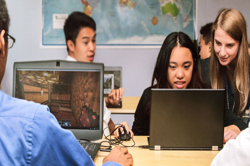AI ethics - What's possible, probable and preferred?
The development and ubiquity of Artificial Intelligence raise a number of social and ethical matters that students can explore in the Digital Technologies classroom. This lesson idea outlines a project to help students frame such discussions using the curriculum Key Idea of Creating preferred futures, tying into Critical and Creative Thinking.
Additional details
| Year band(s) | 9-10 |
|---|---|
| Content type | Lesson ideas |
| Format | Web page |
| Core and overarching concepts | Impact and interactions |
| Australian Curriculum Digital Technologies code(s) |
AC9TDI10P10
Evaluate existing and student solutions against the design criteria, user stories, possible future impact and opportunities for enterprise
AC9TDI10P11
Select and use emerging digital tools and advanced features to create and communicate interactive content for a diverse audience |
| Technologies & Programming Languages | Artificial Intelligence |
| Keywords | Artificial Intelligence, AI, artificial, intelligence, teachable machine, smart phone, algorithms, problem solving, Lesson idea, Lesson plan, home automation, Roseville college, ethics, moral machine |
| Integrated, cross-curriculum, special needs | Digital Literacy |
| Organisation | ESA |
| Copyright | Creative Commons Attribution 4.0, unless otherwise indicated. |
Related resources
-

Level Up: Game design
This unit of work is intended to teach years 9–10 students basic programming, using general purpose programming language.
-

Minecraft Lesson Plans
Find Minecraft lessons spanning primary and secondary school for use with your students.
-

Systems Thinking and AI applications
This lesson takes a systems thinking approach to understanding the place of artificial intelligence (AI) as a component within solutions to real world problems, such as predicting bushfire hotspots, spotting and monitoring animals in the wild, automated horticulture and agriculture, and early detection of medical issues.
-

Habits of a Systems Thinker
This lesson introduces some of the skills and concepts involved with Systems Thinking.
-

Experience ‘Okavango Delta’ in Southern Africa with VR
In this lesson, students will virtually explore one of the wonders of nature called ‘Okavango Delta’ using immersive VR technology.
-

Filter bubbles, bias, rabbit holes and nudging
This lesson focuses on the AI systems that recommend content in various applications that students use on a day-to-day basis. It draws on students’ ethical understandings during analysis of these systems.
-

The shock of the new
Using four inventions from 1985, this lesson sequence explores the impact of innovation, supporting circumstances, how individuals contribute to change and the importance of addressing benefits as well as risks in the development of new systems.
